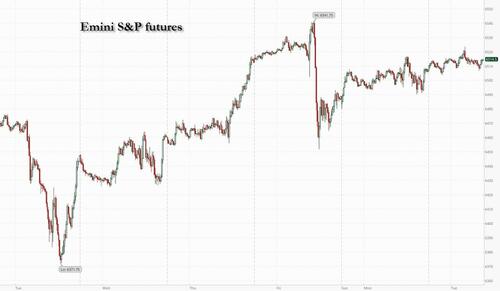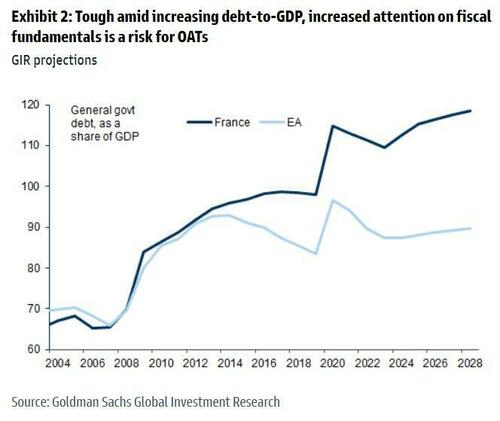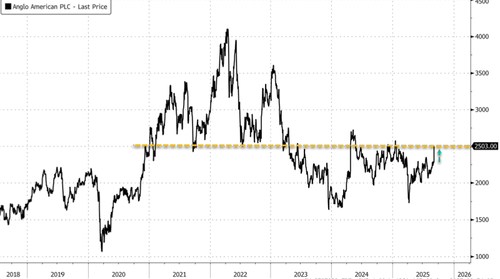Futures, Yields Rise Ahead Of Another Huge Payrolls Revision
Futures are higher led by Tech as expectations of Fed rate cuts continued to drive gains, while Treasuries eased after a rally that pushed global bonds into bull-market territory ahead of what is set to be another huge negative benchmark revision to payrolls. As of 8:30am S&P futures are 0.1% higher, while Nasdaq futures gain 0.2% as Mag7 stocks see a muted bid with AVGO/NVDA leading Semis higher. Both Cyclicals and Defensives have caught a bid with Materials buoyed by the Anglo / Teck deal. The yield curve is bear steepening as 10Y yield rise by 2bps to 4.07%; the dollar slid for a third day, with the yen driving advances among major currencies on renewed signals of policy tightening by the Bank of Japan. Commodities are higher with broad-based strength across all 3 complex but notable increases in crude, natgas, coffee, and iron. Today’s macro data focus is on the NFP revision with BBG survey seeing a 700k negative revision to payrolls and the modest beat in the NFIB Small Business Optimism (100.8, vs Exp. 100.5) where the Hiring sub-index has been a leading indicator for future NFP prints.

In premarket trading, Mag 7 stocks post modest gains (Nvidia +0.2%, Tesla +0.2%, Meta +0.4%, Microsoft +0.3%, Amazon -0.09%, Alphabet is flat, Apple -0.4%)..
- Atlassian Corp. (TEAM) rises 5% after announcing it is ending its data center product over the coming three years and will move customers to its cloud platform.
- Brighthouse Financial (BHF) is up 11% after the Financial Times reported that Aquarian Holdings is in late-stage talks with two Middle Eastern investors to finance a takeover of the life insurer.
- Fox Corp. (FOXA) falls 4% and News Corp. (NWSA) declines 4% after Rupert Murdoch and his children resolved a messy family feud with a settlement that gives favored son Lachlan Murdoch broad control and ensures Fox News and the rest of the sprawling media empire retains its conservative slant.
- Planet Labs (PL) is down 10% after after the company said it would offer $300 million of Convertible Senior Notes due 2030. The shares soared 48% in Monday’s regular session.
- Nano Dimension Ltd. (NNDM) rises 2% after initiating a review of strategic alternatives to maximize shareholder value and named David S. Stehlin as its new chief executive officer, replacing Ofir Baharav.
- Nebius (NBIS) jumps 54% after the AI-centric cloud platform company said it will provide Microsoft access to GPU infrastructure capacity at its new data center in Vineland, New Jersey, over five years.
- Sable Offshore (SOC) falls 9% following news that Governor Gavin Newsom seeks to impose further restrictions on California’s offshore oil industry, a setback to Sable and its controversial project off the coast of Santa Barbara County.
- Teck Resources Ltd.’s US-listed shares (TECK) climb 16% after Anglo American PLC agreed to acquire the Canadian miner for 1.3301 shares for each Teck share. Anglo will also pay its investors a $4.5 billion special dividend ahead of the combination. Anglo shares leaped 9.1% in London.
- UnitedHealth Group Inc. (UNH) rises 4% after saying it expects most of its Medicare Advantage members to be in highly rated plans that earn bonus payments next year, a boon for its health insurance business.
The S&P 500 and US bonds have been on a tear as traders increasingly stoked bets that the Fed will kick-off rate cuts this month. Despite clear cracks in the labor market, investors are wagering that the economy is still sufficiently robust to power corporate earnings. Swaps are pricing at least four quarter-point cuts by the time Fed Chair Jerome Powell’s term ends in May. Some are betting that this year’s easing cycle could begin with a jumbo half-point cut this month as job-market weakness outweighs lingering inflation concerns.
As we first discussed two weeks ago, Tuesday’s revisions to Bureau of Labor Statistics data for payrolls for the year through March are expected to reinforce the view of a US jobs slowdown. Later this week, the core consumer price index for August is projected to show an increase of 0.3% for a second month in a row, indicating that progress on reducing price pressures has stalled.
The BLS figures “would be a big change in the job market narrative,” ING rates strategists Michiel Tukker and Benjamin Schroeder wrote in a note. This “could fuel questions of why the Fed shouldn’t cut by 50 basis points this month.”
“This is a supportive combination for equity markets,” said Marija Veitmane, senior multi-asset strategist at State Street Global Markets. “We believe that AI demand is still strong and will continue to support earnings in the sector, pushing returns in the sector — and hence overall equity market performance — higher.”
In Europe, the Stoxx 600 posted modest gains as investors looked out for the next steps in France’s battle to repair its finances. Anglo American Plc rallied more than 9% after agreeing to a tie-up with Canada’s Teck Resources Ltd. Bonds weakened across the board. In France, bonds were little changed as President Emmanuel Macron started his search for a premier capable of steering a budget through a deeply fractured National Assembly. The continued lack of common ground has weighed on sentiment, driving up the country’s risk premium.
“No one was expecting a bloodbath on the markets today, it’s clear that the worst-case scenario of snap elections is not taking place, at least right now,” said Vincent Juvyns, chief investment strategist at ING in Brussels. “So at the moment we’re muddling through, but with a spread with Germany that is at levels of the sovereign debt crisis of 2012.”
Earlier in the session, Asian equities advanced, as tech and Chinese property stocks climbed, and investors continued to eye prospects for interest rate cuts by the Federal Reserve. The MSCI Asia Pacific Index rose as much as 0.8% to the highest since February 2021, with TSMC, Alibaba and Tencent among the biggest boosts. Taiwan’s Taiex jumped more than 1% to a fresh record, and Korea’s Kospi touched a new high for the year. Indonesia led decliners after the nation’s finance minister was abruptly removed. “Further Fed rate cut bets are fueling positive sentiment in Asia today, especially in growth areas like tech that will rally in these conditions,” said Nick Twidale, chief market analyst at AT Global Markets in Sydney. “In the near term, we can push higher and test record levels for Asian stocks, but may see some profit-taking across all markets ahead of key US inflation data.” Indonesia’s Jakarta Composite Index slipped as fiscal concerns mounted after after President Prabowo Subianto replaced Sri Mulyani Indrawati as finance minister. While Purbaya Yudhi Sadewa, who is taking over the role, vowed to keep Indonesia fiscally healthy, Indrawati enjoyed widespread respect among global investors.
In FX, the Bloomberg Dollar Spot Index is down 0.2%. The Japanese yen rose 0.8% against the greenback, taking USD/JPY firmly below 147 after Bloomberg reported Bank of Japan officials are of the view that it may be possible to raise interest rates again this year regardless of domestic political instability. The Aussie dollar also outperforms, rising 0.4% as it benefits from higher iron ore prices.
In rates, treasuries declined, pushing US 10-year yields up 2 bps to 4.06%. Gilts and bunds are also in the red. French 10-year borrowing costs did rise above Italy’s for the first time, although this was down to technical reasons.
In commodities, Oil rose for a second day as investors weighed the prospect for softening demand after Saudi Arabia cut pricing for most of its grades. WTI crude futures rise 1% to near $62.90 a barrel. Spot gold is up almost $20 and flirting with a record. Iron ore climbed for a sixth day and headed for its highest close in more than six months on expectations that Chinese demand will gather momentum. Bitcoin rises 1% to around $113,000.
Looking to the day ahead now, and data releases include French industrial production for July, the US NFIB small business optimism for August, and there’s the preliminary benchmark revision for US payrolls. From central banks, we’ll hear from the ECB’s Nagel and Villeroy, and BoE Deputy Governor Breeden.
Market Snapshot
- S&P 500 mini +0.1%
- Nasdaq 100 mini +0.2%
- Russell 2000 mini little changed
- Stoxx Europe 600 -0.1%
- DAX -0.5%
- CAC 40 little changed
- 10-year Treasury yield +2 basis points at 4.06%
- VIX +0.1 points at 15.2
- Bloomberg Dollar Index -0.2% at 1196.41
- euro little changed at $1.1765
- WTI crude +1.2% at $63/barrel
Top Overnight News
- The level of U.S. employment for the 12 months through March could be slashed by as many as one million jobs when the government publishes its preliminary nonfarm payrolls benchmark estimate on Tuesday. The payrolls benchmark revision would come on the heels of news last Friday that job growth almost stalled in August and the economy shed jobs in June for the first time in 4-1/2 years. It would suggest the labor market was already struggling before President Donald Trump's aggressive tariffs on imports. RTRS
- After two federal courts have found that many of the steep emergency tariffs imposed by Trump are illegal, if the Supreme Court rules that Trump did not have the authority to impose the tariffs, the U.S. government could be obligated to refund importers anywhere from $750 billion to $1 trillion, Treasury Secretary Scott Bessent warned. This could potentially place upward pressure on yields. CNBC
- South Korean companies have routinely used unsuitable visas for workers sent to the US to build multibillion dollar advanced manufacturing sites. The admission comes after dramatic raid last week by ICE at a battery plant being built by Hyundai and LG in Georgia, which led to the detention of 475 workers. White House officials warn more such immigration actions are being planned FT.
- The world’s biggest oil and gas companies are cutting jobs, slashing costs, and scaling back investments at the fastest pace since the coronavirus market collapse, as execs brace for a prolonged period of lower crude prices. FT
- Israel ordered Gaza City’s one million residents to leave in advance of a major military offensive. BBG
- US Senate Banking panel to vote on Miran's Fed nomination on September 10th: BBG
- White House is preparing a report critical on the Bureau of Labor Statistics: WSJ
- Taiwan’s exports hit a record $58.5 billion in August, surging more than 34% from a year ago, boosted by strong tech demand and the AI boom despite new US tariffs. BBG
- BOJ officials are of the view that it may be possible to raise the benchmark interest rate again this year regardless of domestic political instability, as economic conditions have developed in line with expectations. RTRS
- Officials in Europe are considering potential sanctions against China for buying Russian oil. FT
- A measure of France’s borrowing costs exceeded Italy’s for the first time in the euro zone’s history, signaling investor concerns. French PM Francois Bayrou will resign today. BBG
Trade/Tariffs
- Japan's trade negotiator Akazawa said US tariffs on Japanese goods, including cars, will be lowered by September 16th, according to Reuters citing a post on X. However, Akazawa later commented that tariff discussions with the US are not fully resolved and that Japan must ensure the trade deal is carried out.
- South Korea and the US are to resume working-level talks regarding tariffs, according to Yonhap
- South Korea's presidential adviser said US trade negotiations are being delayed due to the issue of FX market impacts from the USD 350bln package and have asked the US to help find a solution to the capital market impact, while they told the US that they can't agree on terms similar to Japan's USD 550bln deal.
A more detailed look at global markets courtesy of Newsquawk
APAC stocks traded mixed as the region failed to fully sustain the mildly positive handover from Wall St, with price action contained amid light fresh catalysts and as participants looked ahead to upcoming events, including inflation data scheduled in the next couple of days. ASX 200 was dragged lower with notable weakness in Energy, Industrials, Real Estate and Financials, with sentiment also not helped by a deterioration in consumer confidence and mixed business surveys. Nikkei 225 initially rallied above the 44,000 levels to print a fresh record high, but then gradually faded its gains as political uncertainty lingered. Hang Seng and Shanghai Comp were mixed with the Hong Kong benchmark led higher by outperformance in real estate and tech, with the former helped as China's MIIT pledged to accelerate breakthroughs in high-performance chip technology. Conversely, the mainland lagged amid lingering global frictions with EU officials reportedly discussing potential sanctions on China and other parties for the purchase of Russian energy, while Chinese President Xi recently took aim at a 'certain country' increasing trade war risks.
Top Asian News
- BoJ reportedly sees some chance of hiking this year, despite the political situation, via Bloomberg citing sources; likely to keep rates unchanged on September 19th. Sees steady progress towards the BoJ price target. Sees the US trade deal as removing some risks to growth. Some officials are even of the view that a hike could be appropriate as early as October.
- Reuters sources report that while political uncertainty in Japan will not derail the BoJ's normalisation plan, it could impact the timing of the next hike; add, "BoJ does not need to hike in the midst of turbulence". "no rush...as long as it gets another rate hike done possibly by early next year".
- Bank of Japan likely to slightly reduce purchases of super-long Japanese government bonds in Q4 2025, according to Reuters sources. BoJ to make final decision on 30 September, influenced by 20-year government bond auction on 17 September and market volatility in super-long JGB yields.
- China's Ministry of Industry and Information Technology said in a briefing that China is to accelerate breakthroughs in high-performance chip technology and will guide 10-gigabit optical networks from pilot testing to deployment.
- Japanese Finance Minister Kato said he will carefully consider the possibility when asked about entering the LDP leadership race, while he noted that Japan's economy is showing bright signs, but there is a need to support those suffering from rising prices, including food prices.
- Japanese LDP politician Kono reiterated that if the BoJ delays rate hikes, it would boost inflation, and noted they need to fix a weak yen, so the BoJ needs to hike rates, while he added that a sales tax cut would increase the deficit, and said he is 'sleeping on' whether to run for LDP leadership.
European bourses (STOXX 600 U/C) opened modestly firmer across the board, but now display a mixed picture, though with nothing really behind the slip in sentiment. European sectors opened with a strong positive bias, but as sentiment slipped, sectors are now mixed. Basic Resources tops the pile, boosted by gains in Anglo American (+10%); the Co. and Teck Resources (+10.3% pre-market) have merged to create a USD 50bln mining giant; the merger is expected to yield USD 800mln in annual synergies. Elsewhere, Banks and Media complete the top three; for the latter, UMG (+2.2%) boosts the sector after receiving a broker upgrade.
Top European News
FX
- DXY edged higher through the European session shortly after printing session lows coming out of APAC hours, where for the most part DXY saw some relief from Monday's extension of post-NFP selling and as longer-dated US yields retreated. In terms of state-side news, the US Senate Banking panel is to vote on Miran's Fed nomination on September 10th, according to Bloomberg. Further, White House is preparing a report critical of the Bureau of Labor Statistics, according to WSJ. DXY resides in a 97.253-97.519 range.
- EUR moves at the whim of the buck following initial choppiness coming out of Asian hours. In France, PM Bayrou lost in a landslide as expected, while President Macron is to name a new PM in the coming days, which may come after the September 10th strikes. The OAT-Bund spreads pushed wider after Bayrou’s defeat, though EUR/USD held steady. EUR/USD trades in a 1.1744-1.1780 band.
- JPY firmed in European hours following source reports that the BoJ sees some chance of hiking this year, despite the political situation, via Bloomberg citing sources, but likely to keep rates unchanged on September 19th. Some officials are even of the view that a hike could be appropriate as early as October. Earlier sources via Reuters noted that while political uncertainty in Japan will not derail the BoJ's normalisation plan, it could impact the timing of the next hike: "BoJ does not need to hike in the midst of turbulence". USD/JPY fell under its 50 DMA (147.42) to a 146.56 trough from a 147.56 session high.
- GBP gained a firmer footing at the 1.3500 handle after G10 currencies generally took advantage of recent dollar selling, but with further upside limited amid light catalysts. Overnight, it was reported that UK Chancellor Reeves is to tell ministers to prioritise the fight against inflation in a Cabinet meeting today, according to FT, although this caused little immediate follow-through on exchange rates. GBP/USD resides in a 1.3544-1.3583 range, ahead of BoE's Breeden later.
- Antipodeans are holding the positive bias seen in APAC hours as the pairs are kept afloat after a firmer PBoC reference rate setting, but with gains capped following weaker Australian consumer sentiment and mixed business surveys.
- Norway's Labour Party government won re-election backed by four smaller parties, according to official results.
Fixed Income
- A slightly softer start to the session for USTs, but only modestly so. Specifics light as we look to the BLS NFP benchmark revision report, an Apple event and then 3yr supply. Into this and mentioned supply USTs find themselves a little heavy, towards the lower end of a 113-11 to 113-19 band.
- JGBs were on a gradual descent across the APAC session and into the European morning, initially in-fitting with the modest pullback seen in peers but then accelerating on fresh BoJ sources. Firstly, Reuters reported that political uncertainty will not derail the BoJ’s normalisation plan, but could impact the timing. However, this was followed by a Bloomberg source that the BoJ still sees some chance of hiking this year (markets imply 15bps of tightening by end-2025). Even more hawkishly, the source stated some officials are of the view that an October hike could be appropriate (+8bps implied by markets). The hawkish elements sent JGBs to a 136.73 trough, lower by near enough 50 ticks at worst.
- OATs kicked off the day near enough unchanged to Monday’s close. With a small bout of pressure seen into the close as the French confidence vote hit just minutes before. However, as expected, the price reaction for OATs themselves has been fairly muted, due to the fall of Bayrou being very much priced in. One nuance on the reaction, but only really evident in the spread, was the slightly worse than expected vote split for him, as not all of the central alliance voted ‘for’ Bayrou. A nuance that perhaps explained the modest jump up in the OAT-Bund 10yr spread to 83.38bps this morning, eclipsing the 82.19bps peak that printed when Bayrou announced the vote. If the move continues, we look to the YTD peak at 88bps and then the 2024 peak of 90bps.
- Bunds are softer, with the pressure of a comparable scale to that outlined in USTs above; pressure which came ahead of a double green line outing. The auction was fairly in-line and had limited impact on Bunds. At a 128.97 low, above Monday’s 128.91 base and towards the upper-end of Friday’s 128.51 to 129.20 band; i.e. similar price action to USTs, as outlined above.
- Gilts echo the above. Down to 91.31 at worst but well clear of Monday’s 91.09 base and, like with Bunds and USTs, towards the upper end of a 90.65 to 91.31 range. Specifics for the UK a little light, supply was well received and lifted Gilts off worst levels and to a marginal new high at 91.48; though, the benchmark still languishes in the red by just under 10 ticks. That aside, we await a speech from Chancellor Reeves in the later part of the morning.
Commodities
- Crude edges higher in rangebound trade after the prior day's fluctuations, whereby early gains due to OPEC+ and geopolitics were trimmed after Saudi Arabia lowered premiums for OSPs to Asia and North-West Europe. WTI currently resides in a 62.37-63.16/bbl range while Brent sits in a USD 66.12-66.94/bbl range.
- Precious metals are relatively rangebound trade amid light catalysts and head of risk events, with attention now on data releases, including the BLS prelim. benchmark revisions are scheduled today, followed by PPI on Wednesday and CPI on Thursday. Spot gold currently resides in a USD 3,628.48-3,659.43/oz after printing fresh record highs yet again.
- Base metals lack firm direction with the price action contained within a tight range after the indecisive performance on Monday, and with newsflow light today. 3M LME copper resides in a USD 9,894.20-9,963.70 /t range at the time of writing.
- Iraq sets October Basra medium crude official selling price to Asia at USD 1.35/bbl premium to Dubai average; Selling price for Europe set at -USD 2/bbl versus Dated Brent; Selling price to North and South America at -USD 1/bbl versus ASCI.
- US Interior Secretary says they have the capacity to replace all Russian gas to Europe.
- HSBC expects "OPEC+ to start unwinding 1.65mbd voluntary cuts from October"; HSBC maintains USD 65/bbl Brent forecast from Q4, with rising downside risks from rising market surplus.
Geopolitics: Middle East
- Israel conducted strikes in the vicinity of Syria's Homs, Palmyra and Latakia cities.
- Downing Street spokesperson said Palestinian President Abbas welcomed UK PM Starmer's pledge to recognise a Palestinian state ahead of the UN General Assembly meeting later this month.
- "Iranian government: The regime's leadership will decide to withdraw from the Nuclear Non-Proliferation Treaty", via Al Arabiya.
- Iran-IAEA agreement likely at Cairo talks, according to Tasnim News.
Geopolitics: Ukraine
- Ukraine is at risk of a shortage of air defence weapons after a US DoD review of military aid resulted in slower deliveries, according to officials cited by FT.
Geopolitics: Other
- North Korea's leader Kim observed solid fuel engine tests and said it marks an important change to the nuclear force.
- Chinese President Xi sent congratulations to North Korea's Kim on the founding anniversary, while it was separately reported that President Xi said China is ready to enhance strategic communication and maintain close cooperation with North Korea for regional and world peace, and development, according to Xinhua.
US Event Calendar
- 6:00 am: Aug NFIB Small Business Optimism, est. 100.5, prior 100.3
- 10:00 am: Preliminary Benchmark Payrolls revision Exp -700K, Last -818K
DB's Jim Reid concludes the overnight wrap
The dominant theme in the markets over the past 24 hours has been the continued global bond rally. This has helped ease pressure on the latest French political crisis, which culminated last night in the government losing its confidence vote by 364 to 194. With the defeat having been widely anticipated, the market reaction was muted. But had the fixed income sell-off from earlier last week persisted, the outcome might have triggered a very different response.
According to President Macron’s office, he will nominate a new PM in the coming days. The new PM would then have to find a way to pass a budget for next year. With the far-right National Rally and the far-left France Unbowed calling for snap elections, this would likely require a PM that can keep the centre-left Socialists from voting against the budget, as well as keeping the current centre-right coalition on board. Yesterday’s result implied some cracks within the latter, with the 194 votes for the outgoing government being less than the 210 if all of Bayrou’s allies had voted in favour. Still, the overall sense is that both the centre-right and centre-left face incentives to avoid snap elections, and 10yr OAT-Bund spreads tightened slightly (-2.0bps) ahead of yesterday‘s vote. In a note last night, our economists discuss the key next steps to watch, including on the upcoming budget process (see here). There will be a lot of noise around France over the next few days as tomorrow brings a social media launched day of nationwide protest aimed at bringing the country to a standstill, Friday brings an update from Fitch, and a week on Thursday we have a union-organised day of regional and national strikes. So, a lot going on.
Looking at the fixed income moves in detail, bonds gained across Europe with yields on 10yr bunds (-1.9ps), OATs (-4.0bps), BTPs (-3.3bps) and Gilts (-4.0bps) all moving lower. Treasury yields also moved lower across the curve, with the 2yr yield (-2.3bps) down to its lowest since September 2022, at just 3.49%. The 30yr Treasury yield (-6.7bps) hit a 4-month low of 4.69%. So that helped ease fears about the fiscal situation and means we’re a long way from where things stood last Wednesday, back when the 30yr yield was just a whisker beneath 5%.
The main driver was a continuation of the sentiment post payrolls with increasing confidence of rate cuts dominating the landscape. It's almost as if CPI on Thursday doesn't matter. On inflation, the NY Fed 1-yr inflation expectation series inched up from 3.1% to 3.2% yesterday. However, the consumer expectation series showed that expectations of finding a new job fell to its lowest reading since that series began back in 2013. So that chimed with Friday’s jobs report, where the unemployment rate hit its highest in nearly 4 years, at 4.3%.
All that led to mounting confidence that the Fed would soon be cutting rates, with a growing probability placed on back-to-back rate cuts at the remaining three meetings this year. Indeed, the amount of cuts priced by December’s meeting went up +3.0bps on the day to 72bps by the close. So that would be just shy of the 75bps required to fully price in a rate cut at each meeting, and it’s the most rate cuts priced for 2025 since early May, back when there were still genuine recession fears swirling in the aftermath of Liberation Day. Another beneficiary were gold prices (+1.37%), as the prospect of more rate cuts saw them surge to a fresh record of $3,636/oz. It's up a further +0.34% higher overnight.
This narrative of labor market weakness could well get further support today, as the Bureau of Labor Statistics are releasing their preliminary benchmark revision for payrolls at 10:00 Eastern Time. Basically, they do a big revision of the payroll numbers each year to benchmark it against the Quarterly Census of Employment and Wages (QCEW). And although the final numbers don’t get published until March 2026, they announce the preliminary revisions beforehand, which will give us a better sense of how those are likely to move. In terms of today’s announcement, our US economists write that the latest QCEW from Q4 2024 suggests that the average monthly payroll gains over April 2024-March 2025 could be revised down by roughly 50-60k, from a starting point of 146k. So that would imply a lot less momentum in the labour market in the period running up to Liberation Day. But bear in mind this revision only goes up to March 2025, so whatever happens today, it isn’t going to add to our sense of where the labour market is right now. Note that Bessent suggested the annual revision might be around 800k, when speaking over the weekend. This averages 66.6k per month if his number is to be taken literally rather than just an approximate level for the press.
For equities, the rate cutting narrative outweighed fears about an economic slowdown. So that led to a decent advance on both sides of the Atlantic, with the S&P 500 (+0.21%) closing less than a tenth of a percent from its record high, while the NASDAQ (+0.45%) hit a record high of its own. That said, defensive sectors struggled, leaving the equal-weighted S&P 500 (-0.04%) marginally lower. Meanwhile in Europe, the STOXX 600 (+0.52%) moved higher, and France’s CAC 40 (+0.78%) put in a decent performance too ahead of the result of the confidence vote.
Asian equity markets are mostly higher this morning. Across the region, the KOSPI (+1.11%) is leading gains, rallying for the sixth day, while the Hang Seng (+0.80%) is also trading notably higher, hitting its highest level since late 2021 despite paring gains above 1.5% earlier. Meanwhile, the Nikkei (+0.11%) has also surrendered larger gains, dropping over a percentage point from its morning highs. Elsewhere, the S&P/ASX 200 (-0.60%), the CSI (-0.41%) and the Shanghai Composite (-0.30%) are bucking the regional trend. S&P 500 (+0.14%) and NASDAQ 100 (+0.17%) futures are trading slightly higher.
To the day ahead now, and data releases include French industrial production for July, the US NFIB small business optimism for August, and there’s the preliminary benchmark revision for US payrolls. From central banks, we’ll hear from the ECB’s Nagel and Villeroy, and BoE Deputy Governor Breeden.
Tyler Durden
Tue, 09/09/2025 - 08:36







Recent comments